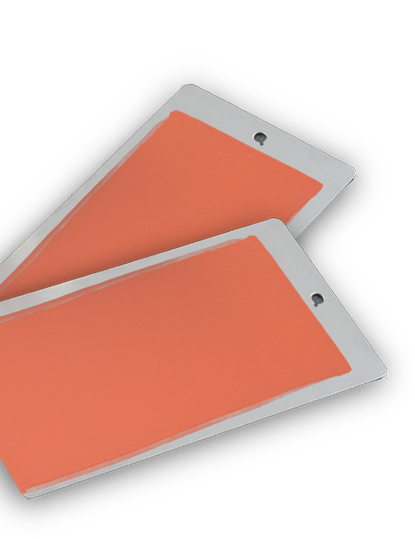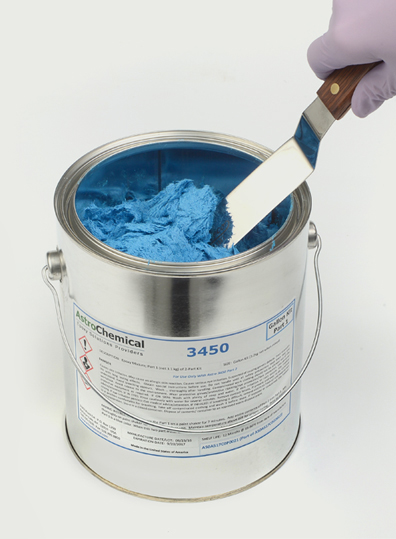FAQ's
Frequently Asked Questions
Some of the most commonly asked questions about Astro Chemical and our products.
Understanding Thixotropic Materials
Oftentimes certain high-viscosity products such as pastes, putties, or encapsulants are referred to as ‘thixotropic.’ But what does that really mean? A material is considered thixotropic when its viscosity decreases in response to an external force. This force can take the form of shear (such as squeezing or spreading) or agitation (stirring or shaking). An everyday example of a thixotropic substance is ketchup. On its own, ketchup appears very thick, yet it becomes easily pourable when shaken, squeezed, or spread.
Thixotropic materials exhibit an interesting property: they gradually return to their original state once the force is removed. Technically, these materials recover to a viscosity close to their original level after a certain period of rest (typically between 80% and 100%). This aspect of ‘recovery time’ can actually be a key performance property. For instance:
High-Viscosity Pastes & Putties: When formulating a high-viscosity paste or putty that needs to hang in place and resist sagging, a short recovery time is critical. This ensures that the material remains in position once applied via force (e.g., spreading a thixotropic, peanut-butter-like adhesive paste).
Lower Viscosity Paints & Coatings: In contrast, lower viscosity products may benefit from a longer recovery time. This allows the product to self-level before thickening back to its original viscosity. Think of certain self-leveling paints and coatings.
In a lab setting, a viscometer or rheometer is used to assess a material’s thixotropic behavior (also known as thixotropy), and our chemists can calculate a thixotropic index to quantify this property.
Thixotropic materials can be highly advantageous when chosen for the right applications. Reach out to our technical team to learn more about Astro’s range of thixotropic products and how they might suit your needs.
Why is the material crystallized and can it be used?
If an Astro product appears cloudy, hazy or contains small visible free-floating crystals it is likely that the material has crystallized. Crystallization is a natural occurrence within certain high-purity resins and is often induced by wide fluctuations in storage temperature. To minimize crystallization potential, all products should be stored following the recommended storage guidance indicated on the product label.
If crystallization is observed or suspected, do not use the product. In most cases, crystallization may easily be reversed by heating the product to a temperature between 50C and 60C until the crystals dissolve back into a liquid state. This process may take up to 8 hours to complete. Heating to higher temperatures is discouraged as this may lead to gelation, curing, and the evaporation of any solvents present.
If the product is not clear after heating for 8 hours this may be an indicator that the product has begun to cure. In these cases, we recommend contacting the Astro Lab for additional guidance.
Defining Thermal Classification
There are a variety of industry standards used to define thermal classification of a given chemistry. Astro products are typically classified using the IEC 60085 standard, which is commonly used in both the power generation and electric motor industries. While seemingly straight forward, the process of establishing a product’s Relative Thermal Index (RTI value) for thermal classification is highly dependent on the proposed use application and the acceptable change in performance at elevated temperatures. When classifying to this standard, the Astro Lab typically uses the guidance of the IEC 60216 test method in conjunction with use application parameters in order to establish an RTI value.
To aid in the evaluation of our products, we provide an RTI value on the Technical Data Sheet as based on typical use applications for the product. Where possible, a second RTI value is provided based on alternate end-point assumptions for performance loss at elevated temperature.
The evaluation of thermal classification for performance coatings is often carried out using an alternative test method. Please refer to the product TDS or contact the Astro Chemical Lab for questions regarding these products, or to discuss in the context of your application needs.
What do you recommend for storage conditions?
Proper storage is critical to maintaining the quality of an engineered coating, adhesive, saturant or encapsulant. Failure to follow recommended storage instructions can result in compromised material properties during application and in the final cured product.
All Astro products should be stored in their original, sealed containers at room temperature out of direct sunlight. Excessive heat can cause accelerated aging, premature cure/solidification, and may even pose a safety risk for products designated as flammable. Excessively low, and below-freezing storage temperatures can lead to crystallization.
Always refer to the Astro product label for the most up-to-date product-specific storage guidelines.
How do you evaluate shelf life?
We define shelf life as “the period of time a product remains suitable-for-use when stored within the recommended storage conditions.” When used during this period, the product is expected to achieve the intended performance properties when fully cured under proper conditions.
Product expiration dates are calculated as beginning from the date of manufacture.
All Astro product labels indicate the product’s manufacture date, expiration date, and usable shelf-life. Expiration dates provided on our labels are always based on optimal storage conditions that allow the maximum shelf life possible. Always refer to the Astro product label for specific details regarding any purchased materials.
When do I request COC or COT?
The Certificate of Conformance (COC) and Certificate of Test (COT) are documents that validate specific product batch information to a specific customer purchase order. To properly collect the data and generate the certificates they must be requested at the time the purchase order is placed*. This guarantees the correct batch-specific information is recorded prior to shipment.
*COC’s and COT’s are an additional cost. Contact [email protected] for pricing information.
What is your return policy?
All returns must be received within 60 days of the original shipment. Due to shelf-life limitations and storage requirements, our Quality System is not able to accommodate product returns for credit for product that has been out of our inventory controls for more than 60 days.
Return requests can be placed with our customer service team at [email protected] and must include:
- Customer name and contact information
- Reason for return
- Customer Purchase Order and/or Astro Work Order associated with the product
- Astro product code, quantity, and manufacture date
- Condition of each item and verification of product storage conditions since initial receipt from Astro
- Verification that all items to be returned are in their original, unopened containers
Each request will be evaluated based on the information provided and if approved, an RMA form with return instructions will be provided.
Any product returned without prior approval will be refused.
All returned products must be shipped prepaid by the returner in the original, unopened Astro product containers. Opened containers are non-returnable, not suitable for shipping, and must be disposed of at the Customer site. Shipping previously opened containers risks violating chemical shipping regulations and may result in significant fines to the returner. Astro will refuse any shipments suspected to be opened, leaking, damaged, or are otherwise flagged as non-compliant with the associated shipping regulation.
Are there shipping network limitations?
There are many regulations governing the transportation of products designated as hazardous (‘Hazmat’). While most freight carriers offer some Hazmat delivery service, oftentimes their Hazmat delivery networks can be limited with certain countries and locations being unserviceable for hazardous goods delivery. Where possible, our shipping team will work with the carrier to recommend the closest location to your destination address where the shipment may be delivered.
Why do we need to provide an Ultimate Destination address and Freight Forwarder?
As the hazmat shipper, Astro must generate the necessary shipping documents (Bill of Lading, Certificate of Origin, Restricted Article, and Non-Restricted Declarations). The Ultimate Destination Address is needed to complete these documents and must also be labeled on each parcel as per regulations. This information is necessary before we are able to prepare a shipment.
What is an International Handling Fee?
This fee is charged when Astro is preparing the export paperwork necessary for shipments leaving the USA. The amount of the charge varies based on the destination country/region, and the work involved in supporting information and documentation while in transit.
What is a Hazmat Fee?
Materials that are classified as hazardous require specialty packaging and documentation be prepared by one of our certified hazmat shippers. The hazmat fee represents the number of hazmat parcels that will be needed for the order.
The number of hazmat parcels vary depending on 1) the restrictions on the product being shipped, 2) the mode of shipment (air is typically more restrictive than ground or ocean), and 3) the quantity of each restricted product ordered.
What are your lead times?
We understand our customers’ time-sensitive needs and stock a large number of our products to respond quickly for shipment worldwide. Depending on size and complexity, most orders can be prepared for shipment within 48 hours of receipt and confirmation, within our normal business hours.


